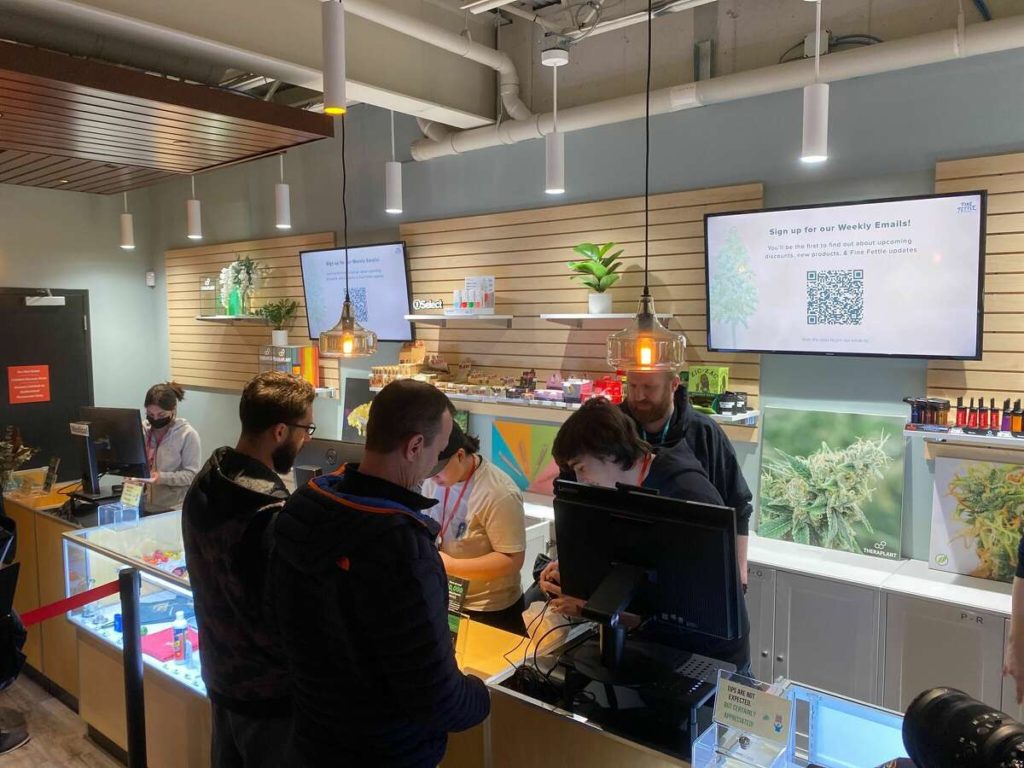The start of recreational marijuana sales in Connecticut Tuesday brought much fanfare but not the same level of demand seen in other states that have legalized cannabis in recent years.
Ahead of the first stores opening, officials urged patience with expectation that there could be long lines and traffic in the initial days. Only a few customers waited in advance of retail sales, though the lines began to grow as the day wore on.
“It’s not going away anytime soon so feel free to come back tomorrow or wait a few days,” said Meriden Mayor Kevin Scarpati, standing just a few hundred feet from where the dispensary Zen Leaf would start selling to recreational customers in addition to medical patients.
A total of seven stores opened across the state: one in Newington, Willimantic, Montville, Branford, New Haven, Stamford, and Meriden. Stores expected to open in Torrington and Danbury were approved to open, but not yet ready. It is expected more stores will open in 2023, but the initial openings are medical marijuana dispensaries that are now operating as hybrids with both medical and retail sales.
At the Fine Fettle dispensary in Newington, Elijah Giguere of Hartford said he had preordered some flower and was here early, among the first five recreational buyers to arrive by 9:30 a.m.
“I showed up early in celebration and passion for this moment,” he said. “There are a lot of peoples’ lives who are destroyed by alcohol and I think weed is a better alternative.”
First in line at Fine Fettle’s Stamford location was Fairfield resident Dave Novak.
“Ordered online yesterday and got here and made sure I was the first one to get the first stuff,” Novak said, adding that the online ordering process was easy for him.
“I’m not even a big weed guy,” he said. “But I was the first person when they made alcohol available on Sundays in Connecticut. So it’s like alright, let me be the first” for recreational marijuana sales.
“I’m amazed Connecticut waited as long as they did,” he added.
Cheryl Collins, 64, of Meriden, among the dozens of people waiting in line before Zen Leaf opened, said she goes up to Massachusetts every month to purchase cannabis and is looking forward to having an option closer to home.
The dispensary is a 10-minute drive from her home. She said she is chronically ill and smoking helps with her pain. She hasn’t tried to pursue a medical marijuana card, saying she’s felt overwhelmed by that process.
Lt. Gov. Susan Bysiewicz, who was among the state officials on hand in Meriden to mark day one of recreational sales, said the state was turning over “a new leaf to grow our economy and also to grow new opportunities in our state.”
Connecticut will now capture some of tax revenue that has gone to neighboring states, namely Massachusetts, which opened recreational marijuana stores in 2018.
“The good news is our tax rate on marijuana is 4 percent lower than in New York and about the same in Massachusetts so there’s an incentive to buy Connecticut grown products in our state,” Bysiewicz said.
The total tax on recreational cannabis in Connecticut is around 20 percent including the state’s 6.35 percent sales tax, a 3 percent sales tax dedicated to the city or town where the sale occurs and a tax based on the THC content that will cost approximately 10 to 15 percent of the sale price.
The state’s nearly 50,000 medical marijuana patients have been at the “forefront of planning” for recreational sales, Department of Consumer Protection Commissioner Michelle Seagull said. The state advised medical patients to purchase their supply ahead of opening day to avoid any potential disruptions. Monday, the eve of recreational sales, was one of busiest days ever for Zen Leaf, which saw over 400 customers, said general manger Vincent Bucchieri.
To start, DCP is limiting recreational sales to ¼ ounce of cannabis flower, or its equivalent, to ensure that there will be adequate supply for patients and for recreational customers who are 21 and older.
Seagull also encouraged responsible use of marijuana and said DCP required that recreational cannabis products be “packaged and labeled in a way to be very clear that these products contain THC and that they are not intended for children.” State police also warned that while cannabis is legal, “remember that driving while high is still a DUI.”
The first seven stores to open for adult-use sales have the benefit of capturing initial sales and customer base as new cannabis businesses complete steps to come online. Seagull said nearly 100 other businesses are “in the pipeline” and many are expected to open over the course of this year.
A major aim of Connecticut’s adult-use cannabis law is to create an equitable legal market, including giving an opportunity to social equity applicants, who are from areas disproportionately harmed by past prohibition, to get into the legal market. The law also directs some of the cannabis revenues to go towards communities most impacted by the war on drugs.
Social equity applicants, who must meet established thresholds for income, residency, and business ownership, are not among the first businesses to sell to adult-use customers. Some have expressed concern that that puts them at a disadvantaged in Connecticut’s burgeoning market.
“It’s not going to be perfect out of the gate in terms of the entire program from a social equity standpoint,” said Paul O. Robertson, a deputy commissioner at the Department of Economic and Community Development and newly appointed chair of the state’s Social Equity Council. “I think over a period of time, there will be a balance.”
H/T: www.newstimes.com



